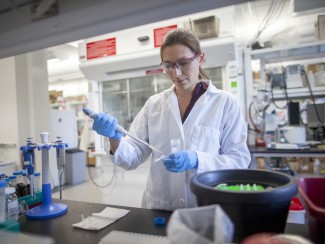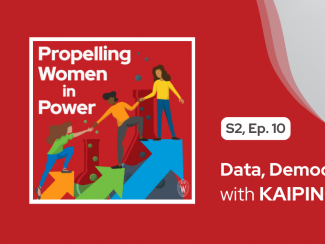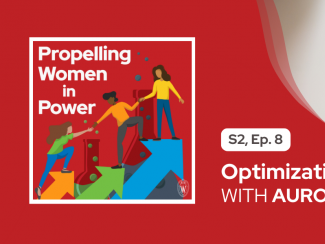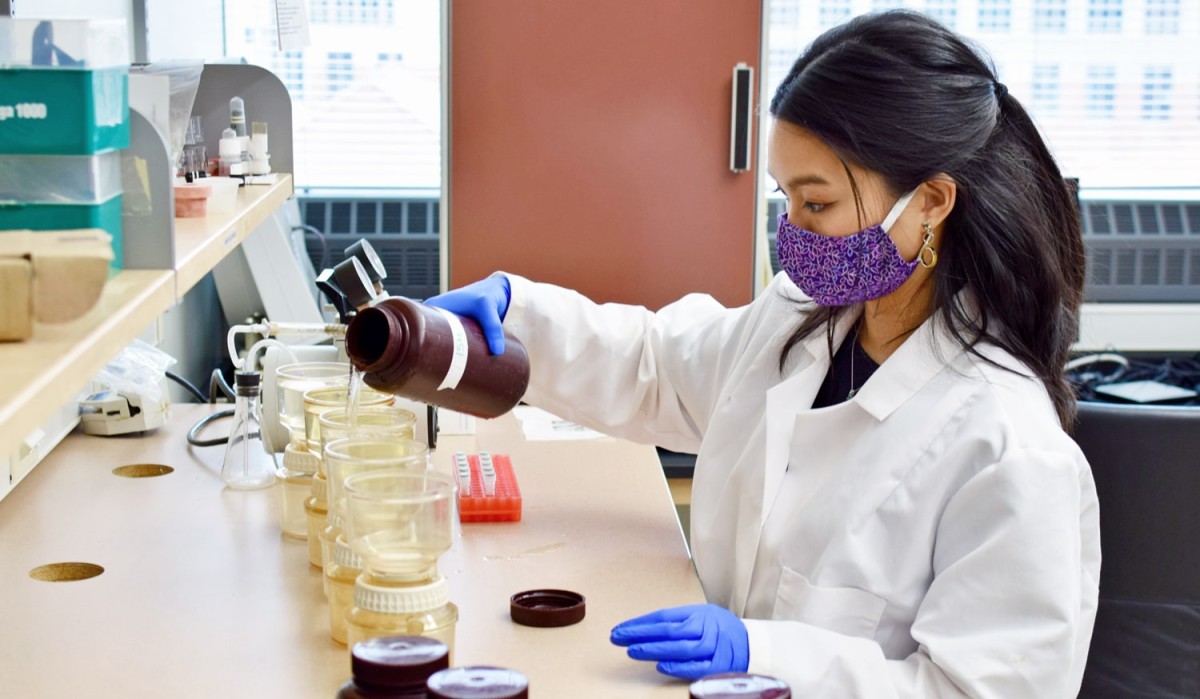
Our graduate students and postdoctoral researchers play an enormous role in the transition to a sustainable, resilient, and affordable energy future that is centered on social and economic equality. From lab experiments to field work to classrooms, these leaders of today and tomorrow are our catalysts for energy discovery.
In this series, we learn more about what inspired these talented researchers, what brought them to their field of study, and the questions that drive their work at the Wisconsin Energy Institute.
This week we spoke with Patricia Tran, a graduate student in Katherine McMahon’s lab at the University of Wisconsin–Madison. Patricia is from Montreal, Canada and studied environmental science and bioinformatics for her Bachelor of Science with Honors at McGill University. She then obtained her Master of Science in Biology from Concordia University. She is now a part of the Freshwater and Marine Sciences Ph.D. program at the University of Wisconsin–Madison and is co-advised by Katherine McMahon and Karthik Anantharaman.
What brought you to UW-Madison and the Wisconsin Energy Institute?
Prior to coming to UW-Madison, I studied under-ice microbial ecology in lakes in Canada for my Master of Science degree. In Canada, completing a Master of Science degree is the standard route before beginning a Ph.D. program in the sciences. I was part of a training program of the Natural Sciences and Engineering Council of Canada (NSERC) that gave me the opportunity to have a fully funded industry or academic internship. I decided to test the academic route and went to Dr. McMahon’s lab at UW–Madison to work on winter limnology in Lake Mendota in early 2018. At the time, I did not know I wanted to do a Ph.D. I decided to do a PhD at UW-Madison later that same year, after Dr. McMahon and my other Ph.D. advisor Dr. Karthik Anantharaman asked me if I was considering a PhD because I really enjoyed my experience during that internship. Additionally, UW–Madison is a hub for limnology research and microbial ecology, and I felt I could grow as a scientist here.
I would like to play a part in inspiring folks to pursue personally meaningful and curiosity-driven career paths.
Patricia Tran
Can you tell me about your research in a way that you would describe to friends or family?
I study what microbes are doing in lakes when there is no oxygen. During the summer in lakes, the water at the surface is usually warm and full of oxygen, but the bottom of the lake is cold and has no oxygen. While the lack of oxygen can be problematic for animals such as fishes, microbes can really thrive in those environments. I study how microbes in the lake are responsible to processing things like carbon, nitrogen, or sulfur, and what that means for the overall nutrient cycle of the lake.
To study that, I do a lot of fieldwork in the summer to collect environmental data, and water from which I extract and sequence the DNA of microbes including bacteria and viruses.
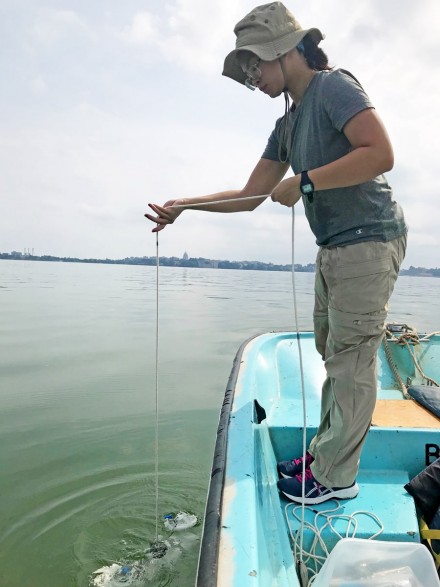
Then the remaining of the year, I use bioinformatics, which is the use of computer algorithms to analyze these pieces of DNA. I can put together all these small DNA pieces into whole genomes of organisms. These genomes contain information about the genes the organisms encode. Some of those genes are important to determine if an organism can do photosynthesis, nitrogen fixation, sulfate-reduction, or other ecologically relevant processes. I pull together this information about the bacteria and viruses over many time points in the year, along with the environmental data I collect to inform a holistic view of microbial ecology and nutrient cycling in lakes.
What led you to this area of research?
During undergrad, I was interested in environmental sciences and conservation, and got to complete experience intensive fieldwork seasons, mostly in forested environments. I also worked in a plant-microbe interaction lab where I was introduced to microbiology and bioinformatics, which led me to complete a graduate certificate in bioinformatics. I wanted to do a Master of Science. where I could combine my interest in computational methods and for ecology, and that would allow me to train as both a skilled computational scientist and ecologist while providing me more career opportunities. I found a lab where I could do both, working in freshwater lake microbial ecology, specifically winter limnology. After completing my Master of Science, it then made sense to come to UW-Madison because of both the strong limnology and microbiology program, and the number of resources and colleagues here.
What is a practical use or application of your research outside the lab?
The methods that we use to study microbes are at the forefront of bioinformatics methods to analyze genomics data, which is a type of data that is increasingly popular to generate across many fields such as agriculture, soil science, or medical field. Despite this amount of data, the interpretation and analysis of it remains challenging. Therefore, even though I apply my skills to lakes in my case, I could apply these same methods to other fields to inform other questions.
In terms of lakes, we really need to understand more about what’s happening in the water column when there is no oxygen, because across the world, lakes will become increasingly warmer, and increasingly anoxic–meaning they lack oxygen–in the coming century with ongoing climate change. Anoxic zones are often associated with negative impacts on wildlife. In those anoxic zones, microbes are the principal life forms that are responsible for the cycling of nutrients and affect organisms much beyond their own selves. Therefore, understanding which and how microbes are responsible for cycling nutrients, and how they are influencing compounds and other organisms in the water can help us understand how conditions may change in the future.
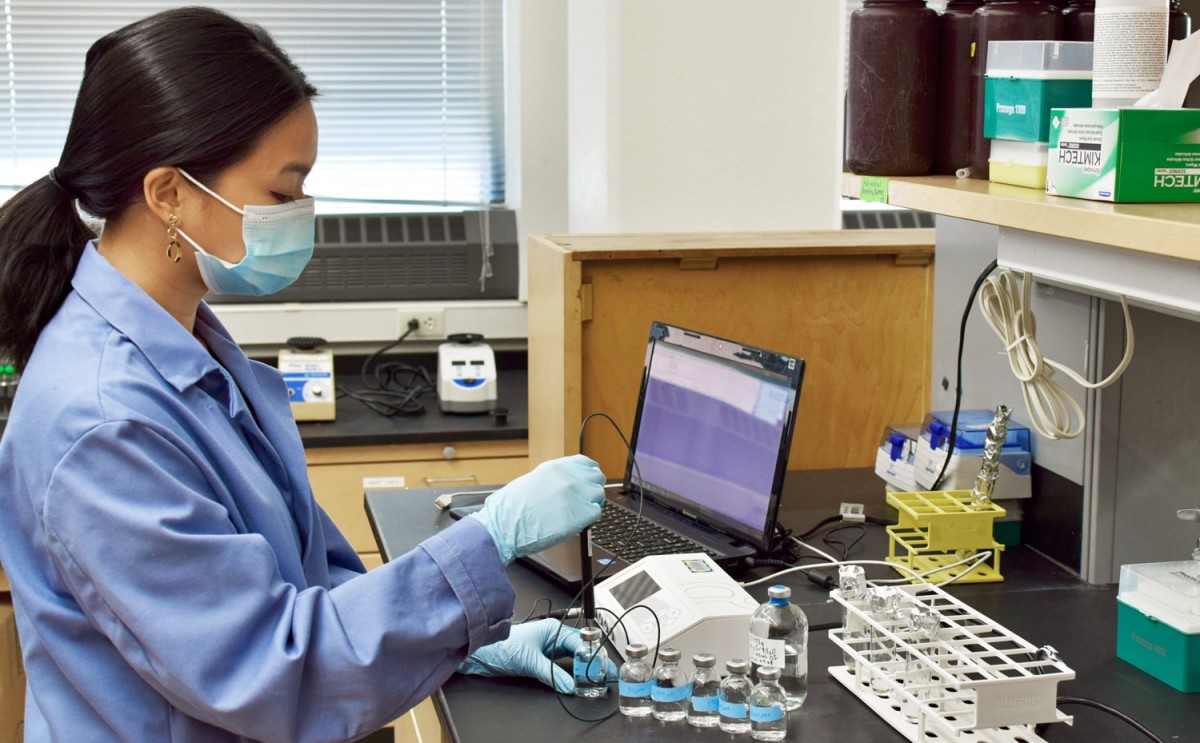
What is your favorite memory at as a graduate student so far?
Meeting some colleagues who have become meaningful friends.
What is your favorite place on campus? Why?
I like Memorial Union and the Terrace because of the food spots, the art studio, and the seating to enjoy a view of the lake while either studying, writing, or having at meeting. It’s also centrally located.
What do you hope to accomplish after your time at UW-Madison?
After my PhD I would like to have a career where I can continue training, teaching, and mentoring students, or trainees, whether that is in academia or not.
What do you do when you’re not working/for fun?
I have a lot of hobbies that I enjoy doing outside of work. I participate in a yoga community in the Microbial Science Building every week, I often go to do pottery at Memorial Union, and I frequently go bouldering and rock climbing. In the winter, I enjoy cross-country skiing in the many Madison-area parks.

